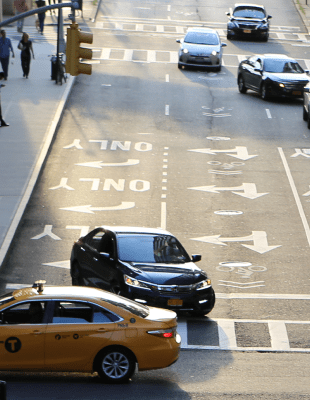Table of Contents
The challenge
Dublin’s urban logistics model is susceptible to traffic congestion and the inefficient use of loading bays and parking areas for commercial vehicles.
10%
The European Union (EU) is facing the need for sustainable urban development due to population growth and changing consumer trends in many of its major cities that are causing traffic congestion. The SENATOR project aims to respond to these challenges by creating a new urban logistic model to enhance the sustainability of cities. To test its effectiveness, the plan is being validated in two major cities, Zaragoza, Spain, and Dublin, Ireland.
In Dublin, where there are approximately 550,000 inhabitants, the city is challenged with traffic congestion due to commercial vehicles, inefficient use of loading bays, enforcement difficulties in loading bays, and the inefficient use of commercial vehicles.
The solution
Our CurbIQ product is being used to map out Dublin’s curbside to visualize and understand regulations that relate to logistics and curbside delivery.
5,700
Our CurbIQ solution is being used to create a curbside inventory to support resource decision-making that can be integrated into the planning of Dublin’s logistics operations and positively impact the city’s progress towards a climate-neutral future through adaptations such as optimized deliveries and traffic mitigation. During the test period, CurbIQ was used to map out over 40 kilometers of Dublin’s curbside, which covered most of the Temple Bar area. Using CurbIQ’s Curb Viewer function, we were able to digitally visualize Dublin’s curbside, so that we could pinpoint the most pressing logistics and delivery issues.
Our Curb Converter’s Curb-Level Surveying processes were used to survey the curbside on foot while capturing all relevant information, from signage to parking meters to curb cuts. This data was then processed to generate a digital curb inventory and uploaded to the CurbIQ platform with access provided to Dublin City staff, as well as partners of the SENATOR Project.
Curb Rules API was implemented to enable third-party mobility companies, such as postal operators, to access the curbside information in CDS format for better route planning and more efficient deliveries. This also prevented illegal use of the curbside and helped reduce potential conflicts at the curb between different curb users. The SENATOR project also used this API to integrate this data directly with their mobility management platform.
The impact
The lessons learned from the Dublin SENATOR project will inform the new urban logistics model that will be promoted across the European Union.
40 km
Leveraging CurbIQ to provide greater insight into the usage of the curbside allowed city officials to more accurately assess their urban model and the changes that need to be applied to improve their urban logistics model. The product is directly able to address one of the city’s main challenges by giving detailed information to delivery personnel and drivers about when and how they can use the loading bays and parking areas to create efficiency at the curbside.
Once implemented throughout the EU, the SENATOR project is expected to increase awareness among the public regarding the environmental impact of delivery logistics in the city and reduce carbon emissions by 10%.
Behind the solution
Not done reading?
This also might be interesting for you
- Related Projects
- Related Insights
- Related Blogs







